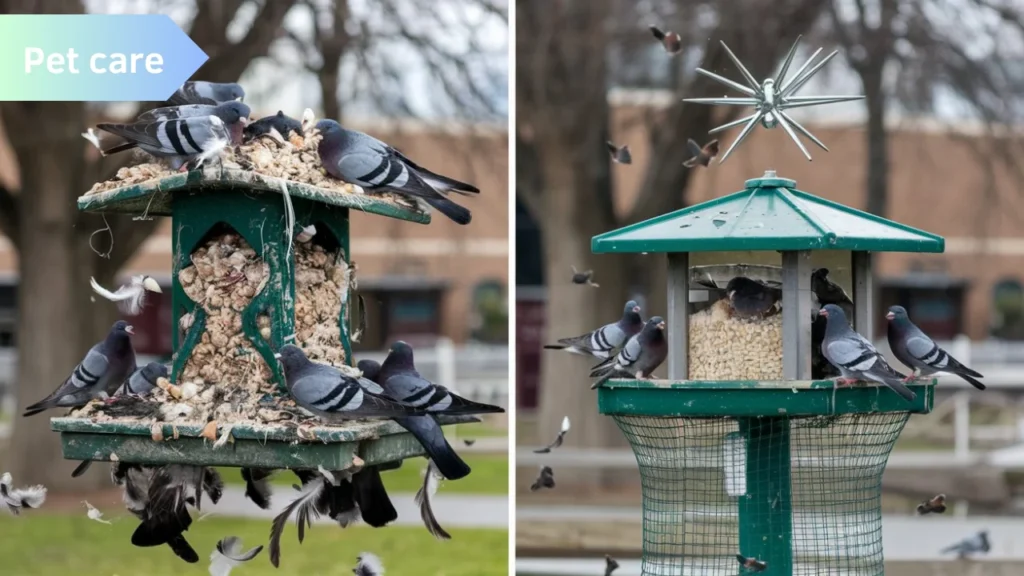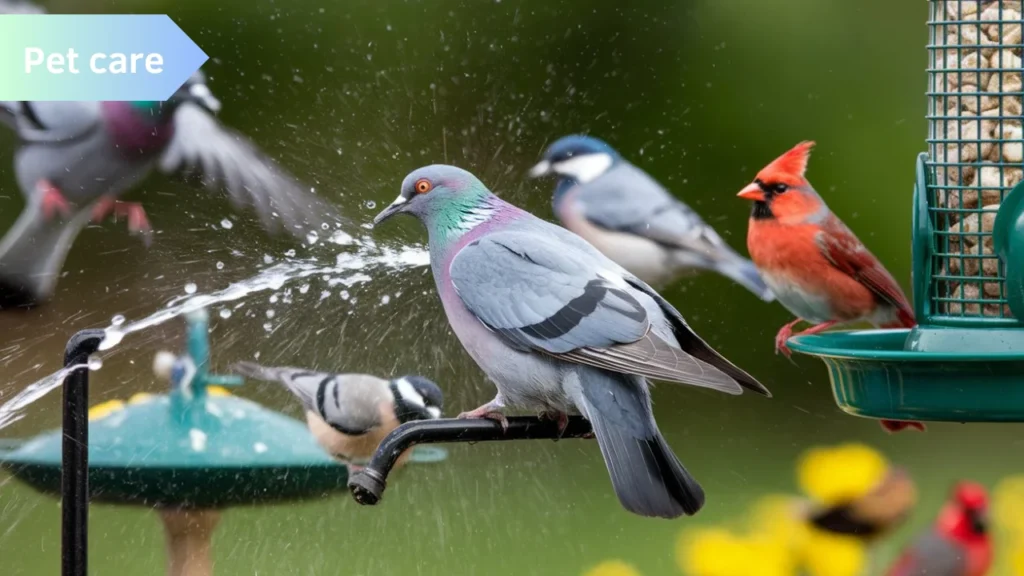Pigeons can be lovely birds in their own right, but when they start taking over your bird feeder, “How to Keep Pigeons Away from Bird Feeders”. These persistent birds often scare away smaller, more desirable species and create a mess in your garden. Fortunately, there are numerous ways to prevent pigeons from monopolizing your bird feeders and reclaim your garden space.
Why Are Pigeons Attracted to Bird Feeders?
Easy Access to Food
Pigeons are opportunistic feeders. If they find an easy food source, they’ll return frequently. Bird feeders offer them easy pickings, and if they can get comfortable, they’ll keep coming back.
Pigeons’ Natural Behavior
Pigeons are ground-feeding birds, and they are naturally attracted to open areas where food is readily available. Bird feeders often provide this type of environment, especially if there are spilled seeds around.
Negative Impacts of Pigeons at Bird Feeders
Scaring Off Smaller Birds
One of the main issues with pigeons is that they can intimidate and scare away smaller birds. If you’re trying to attract finches, sparrows, or other small birds, pigeons can become a big obstacle.
Health and Hygiene Concerns
Pigeons can carry diseases and parasites that may spread to other birds or even humans. Their droppings can accumulate, creating an unhealthy environment around your bird feeder.
Mess and Damage to Your Garden
When pigeons gather, they often leave behind a mess of droppings, broken plants, and scattered seeds. This can make your garden look untidy and damage your plants.

Types of Bird Feeders That Deter Pigeons
Tube Feeders
Tube feeders are designed with small perches and narrow feeding ports, which make it difficult for larger birds like pigeons to access the seeds. This type of feeder is perfect for attracting smaller birds while keeping pigeons at bay.
Caged Feeders
Caged feeders come with an outer cage that only allows smaller birds to reach the food inside. Pigeons, being larger, will struggle to get through the cage, ensuring they don’t dominate the feeder.
Weight-Sensitive Feeders
These feeders close off access when a heavier bird, such as a pigeon, lands on them. Smaller birds are light enough to perch without triggering the mechanism, making weight-sensitive feeders a smart solution.
Location Matters: Where to Place Your Bird Feeder
Elevated or Hanging Spots
Pigeons prefer flat surfaces, so hanging your bird feeder or placing it on a high pole can help deter them. The more difficult it is for them to reach the feeder, the less likely they’ll be to visit.
Away from Ledges and Flat Surfaces
Placing the feeder away from ledges, flat surfaces, or low ground prevents pigeons from easily accessing the seeds. It forces them to work harder for their meal, which they might decide isn’t worth the effort.
Use Pigeon-Repellent Bird Seeds
Safflower Seeds
Safflower seeds are not preferred by pigeons but are enjoyed by many smaller bird species like cardinals and chickadees. Switching to this type of seed can help deter pigeons naturally.
Nyjer Seeds
Nyjer seeds, also known as thistle seeds, are too small for pigeons to eat comfortably. They are perfect for attracting goldfinches and other small birds without attracting pigeons.
Install Anti-Pigeon Spikes and Nets
Benefits of Using Spikes
Installing spikes around the feeder area can prevent pigeons from landing comfortably. They are effective in discouraging pigeons without harming them.
How to Use Nets Effectively
Nets can be used to create a barrier around the bird feeder. This keeps pigeons from accessing the feeder while still allowing smaller birds to feed freely.
Add Motion Deterrents Around the Feeder
Wind Chimes
The sound and movement of wind chimes can startle pigeons and make them uncomfortable, encouraging them to find food elsewhere.
Reflective Objects
Reflective objects, such as old CDs or shiny tape, can be hung near the feeder. The light reflections can deter pigeons from approaching.
Make Use of Sound Deterrents
Ultrasonic Bird Repellents
These devices emit sounds that are inaudible to humans but are bothersome to pigeons. They can be placed near the feeder to keep pigeons away without disturbing other birds.
Recorded Predator Sounds
Playing recorded sounds of predators like hawks or falcons can make pigeons wary and discourage them from visiting your feeder.

Keep the Area Clean
Remove Spilled Seeds and Debris
Pigeons are attracted to scattered seeds on the ground. Regularly cleaning up the area around your feeder reduces the chances of pigeons hanging around.
Regular Maintenance of Feeders
Ensuring your feeders are clean and maintained helps prevent pigeons from finding leftover food that might tempt them back.
Avoid Feeding Pigeons Directly
Removing Easy Food Sources
Make sure there are no other food sources in your garden that could attract pigeons, like pet food or uncovered trash bins.
Redirecting Pigeons Away from the Feeder
If you want to keep pigeons in your garden without them interfering with your bird feeder, set up a separate feeding station specifically for them, away from your main feeder.
Train Pigeons to Stay Away Using Water Sprays
Water sprays can be an effective, humane way to keep pigeons away. If pigeons become a regular problem, you can use a motion-activated water spray to scare them off.
Natural Predators
Attracting Birds of Prey
Encouraging natural predators like hawks can keep pigeon populations in check. Installing perches for birds of prey can make your garden less attractive to pigeons.
Utilizing Cats as Deterrents
Cats can also be effective in scaring pigeons away, but make sure they don’t harm other birds in your garden.
Cover and Shelter
Shrubs and Barriers
Planting shrubs or using artificial barriers can create obstacles that make it harder for pigeons to reach the feeder.
Using Natural and Artificial Covers
Providing natural covers like trees or artificial ones like birdhouses can give small birds a safe space, away from pigeons.
Conclusion
Pigeons can be persistent, but with the right strategies, you can keep them away from your bird feeder while still attracting the birds you want. By choosing the right feeder, placing it strategically, and maintaining the area, you’ll create an environment that’s less appealing to pigeons and more welcoming to other bird.
FAQs
What types of feeders are best for keeping pigeons away?
The best feeders for deterring pigeons are tube feeders, caged feeders, and weight-sensitive feeders. These designs allow smaller birds to access the seeds while making it difficult for larger pigeons to feed.
Are there specific seeds that pigeons dislike?
Yes, pigeons typically avoid safflower seeds and nyjer seeds. These seeds are favored by many smaller birds, making them a great choice to attract the species you want while keeping pigeons at bay.
How can I prevent pigeons from nesting near my feeders?
To prevent pigeons from nesting nearby, regularly clean the area to remove any potential nesting materials. You can also use spikes or nets around the feeder to create a physical barrier that discourages nesting.
Can sound deterrents be harmful to other birds?
Most ultrasonic bird repellents are designed to target specific species, making them safe for smaller birds. However, it’s essential to observe the behavior of your garden’s birds to ensure no adverse effects.
How effective are motion-activated water sprays?
Motion-activated water sprays are quite effective in deterring pigeons. They create an unexpected burst of water that startles the birds, encouraging them to leave without causing them any harm.